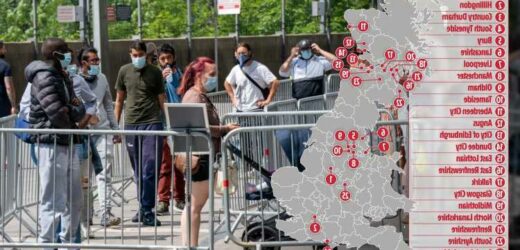TWENTY five areas are now on a Delta variant watchlist – as Covid cases in England have risen to the highest level since February.
Areas such as Glasgow, Oldham and Edinburgh have all seen an increase in cases over the last week, data from the ZOE Symptom Tracker app shows.
🔵 Read our coronavirus live blog for the latest updates
The team has highlighted the areas that could become variant hotspots across local authorities in the UK.
It found that in the last seven days cases have increased in several areas in Scotland.
In Glasgow City, East Lothian, City of Edinburgh, East Renfrewshire, Renfrewshire and Perth and Kinross cases have risen.
There is only one place in England that appears on the list of places where case have also risen and that is Oldham.
The places listed in the top 25 give an indication as to where cases are rising.
TESTING TIMES
It comes as data from NHS Test & Trace shows that cases are currently at their highest levels since February 17 – when the UK was still living through the third coronavirus lockdown.
The data states that between June 17 and June 23, 79,248 people had tested positive for the virus, an increase of 43 per cent on the week before.
Data from Test and Trace also shows that test times have been consistent, but that there had been a drop off between the weeks ending May 19 and June 16.
Over 83.8 per cent of tests were received in 24 hours, compared to 81.8 per cent the week before.
Despite this tests are taking on average slightly longer to turn around with home tests going from 38 to 41 hours and satellite tests from 33 to 37 hours.
A separate data set published today by Public Health England (PHE) also revealed that cases have risen in all regions in the last week.
Case rates per 100,000 were highest in the North East at 346.4 and the lowest in the East of England with a rate of 87.8.
Responding to the figures, Public Health England medical director Yvonne Doyle said: "Across all areas of the country cases are rising rapidly, although it is encouraging to see that hospitalisations and deaths are not rising at the same rate.
"Case rates are currently highest in the younger age groups, who are less likely to be hospitalised – so the vaccine is working to reduce severe disease in the most vulnerable groups.
"Many of us will be joining friends and family to watch England in the Euros on Saturday night, but please follow the guidelines in place to reduce the risk and enjoy the match safely – watching the game outside will always be safer than gathering indoors."
ZOE data shows that infections in Dundee need to be monitored as this is currently the top of the watchlist with 2,873 cases per 100,000 in the last week.
The second most infected areas, according to app data is Aberdeen City, which recorded 2,045 cases in the last seven days.
Away from Scotland and Liverpool is the third areas that experts are saying needs to be monitored.
In Liverpool 2,035 cases have been reported and people in three areas of the city have been urged to get Covid tests as soon as possible due to a rise in infections.
'STARK REMINDER'
Public health officials in the area have highlighted that the rise in cases is down to the Delta variant – which is now the dominant strain in the UK.
The wards of Greenbank, Picton and Riverside were all urged to get tests and Director of Public Health, Matthew Asthton said it's "stark reminder" that Covid hasn't gone away and still poses a threat to people.
He explained: "Rates of infection have rocketed over the last few weeks in those age groups which have not yet been fully vaccinated and is having a knock-on effect for schools, hospitality and employers as people are having to self-isolate.
“It is absolutely vital we continue to do everything we can to keep it under control."
Glasgow, Oldham and Manchester are all after Liverpool, followed by Nottingham, East Lothian and Bolton.
Cases are at 1,072 in Birmingham and 1,065 in Edinburgh.
In Edinburgh public health officials said the rise in cases cannot be attributed to the latest unlocking that took place in Scotland last month.
Across the UK over 44.7 million people have had a first dose of a coronavirus vaccine and 32.8 million have now had a second.
Edinburgh has the lowest vaccination rate out of all areas in Scotland.
Linda Bauld, professor of public health at the University of Edinburgh said: "All the urban areas have been the slowest in terms of delivering the vaccines.
"Edinburgh is not unique in that – it's consistently been Glasgow, Aberdeen, or Edinburgh".
She added that it's more difficult to get people vaccinated in urban areas.
Source: Read Full Article





